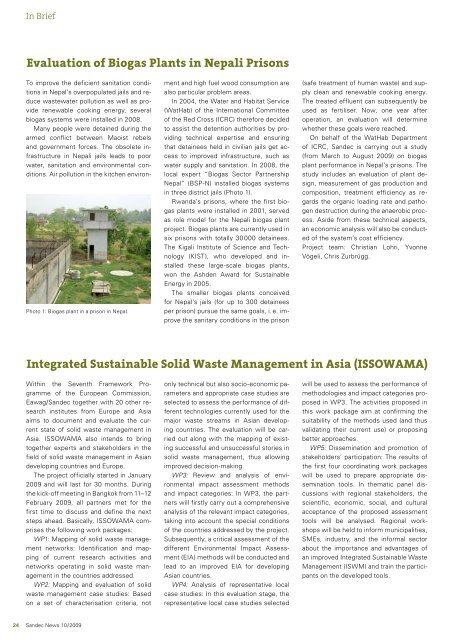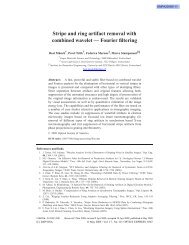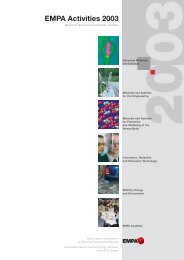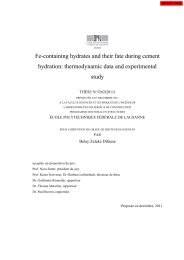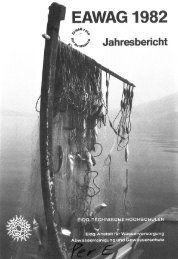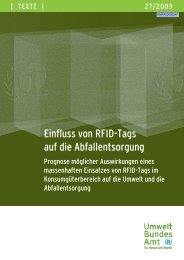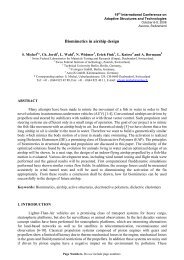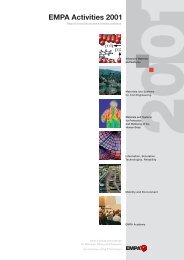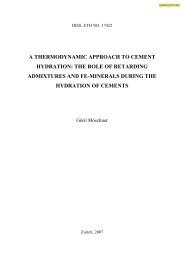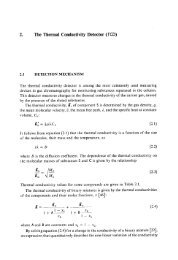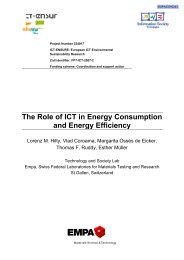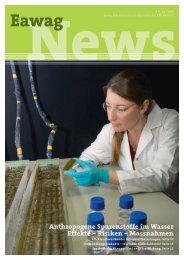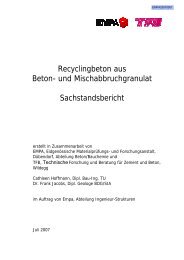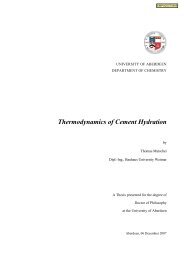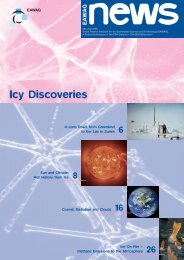Sandec - Eawag
Sandec - Eawag
Sandec - Eawag
You also want an ePaper? Increase the reach of your titles
YUMPU automatically turns print PDFs into web optimized ePapers that Google loves.
In Brief<br />
Evaluation of Biogas Plants in Nepali Prisons<br />
To improve the deficient sanitation conditions<br />
in Nepal’s overpopulated jails and reduce<br />
wastewater pollution as well as provide<br />
renewable cooking energy, several<br />
biogas systems were installed in 2008.<br />
Many people were detained during the<br />
armed conflict between Maoist rebels<br />
and government forces. The obsolete infrastructure<br />
in Nepali jails leads to poor<br />
water, sanitation and environmental conditions.<br />
Air pollution in the kitchen environ-<br />
Photo 1: Biogas plant in a prison in Nepal.<br />
<strong>Sandec</strong> News 10/2009<br />
ment and high fuel wood consumption are<br />
also particular problem areas.<br />
In 2004, the Water and Habitat Service<br />
(WatHab) of the International Committee<br />
of the Red Cross (ICRC) therefore decided<br />
to assist the detention authorities by providing<br />
technical expertise and ensuring<br />
that detainees held in civilian jails get access<br />
to improved infrastructure, such as<br />
water supply and sanitation. In 2008, the<br />
local expert “Biogas Sector Partnership<br />
Nepal” (BSP-N) installed biogas systems<br />
in three district jails (Photo 1).<br />
Rwanda’s prisons, where the first biogas<br />
plants were installed in 2001, served<br />
as role model for the Nepali biogas plant<br />
project. Biogas plants are currently used in<br />
six prisons with totally 30 000 detainees.<br />
The Kigali Institute of Science and Technology<br />
(KIST), who developed and installed<br />
these large-scale biogas plants,<br />
won the Ashden Award for Sustainable<br />
Energy in 2005.<br />
The smaller biogas plants conceived<br />
for Nepal’s jails (for up to 300 detainees<br />
per prison) pursue the same goals, i. e. improve<br />
the sanitary conditions in the prison<br />
(safe treatment of human waste) and supply<br />
clean and renewable cooking energy.<br />
The treated effluent can subsequently be<br />
used as fertiliser. Now, one year after<br />
operation, an evaluation will determine<br />
whether these goals were reached.<br />
On behalf of the WatHab Department<br />
of ICRC, <strong>Sandec</strong> is carrying out a study<br />
(from March to August 2009) on biogas<br />
plant performance in Nepal’s prisons. The<br />
study includes an evaluation of plant design,<br />
measurement of gas production and<br />
composition, treatment efficiency as regards<br />
the organic loading rate and pathogen<br />
destruction during the anaerobic process.<br />
Aside from these technical aspects,<br />
an economic analysis will also be conducted<br />
of the system’s cost efficiency.<br />
Project team: Christian Lohri, Yvonne<br />
Vögeli, Chris Zurbrügg.<br />
Integrated Sustainable Solid Waste Management in Asia (ISSOWAMA)<br />
Within the Seventh Framework Programme<br />
of the European Commission,<br />
<strong>Eawag</strong>/<strong>Sandec</strong> together with 20 other research<br />
institutes from Europe and Asia<br />
aims to document and evaluate the current<br />
state of solid waste management in<br />
Asia. ISSOWAMA also intends to bring<br />
together experts and stakeholders in the<br />
field of solid waste management in Asian<br />
developing countries and Europe.<br />
The project officially started in January<br />
2009 and will last for 30 months. During<br />
the kick-off meeting in Bangkok from 11–12<br />
February 2009, all partners met for the<br />
first time to discuss and define the next<br />
steps ahead. Basically, ISSOWAMA comprises<br />
the following work packages:<br />
WP1: Mapping of solid waste management<br />
networks: Identification and mapping<br />
of current research activities and<br />
networks operating in solid waste management<br />
in the countries addressed.<br />
WP2: Mapping and evaluation of solid<br />
waste management case studies: Based<br />
on a set of characterisation criteria, not<br />
only technical but also socio-economic parameters<br />
and appropriate case studies are<br />
selected to assess the performance of different<br />
technologies currently used for the<br />
major waste streams in Asian developing<br />
countries. The evaluation will be carried<br />
out along with the mapping of existing<br />
successful and unsuccessful stories in<br />
solid waste management, thus allowing<br />
improved decision-making.<br />
WP3: Review and analysis of environmental<br />
impact assessment methods<br />
and impact categories: In WP3, the partners<br />
will firstly carry out a comprehensive<br />
analysis of the relevant impact categories,<br />
taking into account the special conditions<br />
of the countries addressed by the project.<br />
Subsequently, a critical assessment of the<br />
different Environmental Impact Assessment<br />
(EIA) methods will be conducted and<br />
lead to an improved EIA for developing<br />
Asian countries.<br />
WP4: Analysis of representative local<br />
case studies: In this evaluation stage, the<br />
representative local case studies selected<br />
will be used to assess the performance of<br />
methodologies and impact categories proposed<br />
in WP3. The activities proposed in<br />
this work package aim at confirming the<br />
suitability of the methods used (and thus<br />
validating their current use) or proposing<br />
better approaches.<br />
WP5: Dissemination and promotion of<br />
stakeholders’ participation: The results of<br />
the first four coordinating work packages<br />
will be used to prepare appropriate dissemination<br />
tools. In thematic panel discussions<br />
with regional stakeholders, the<br />
scientific, economic, social, and cultural<br />
acceptance of the proposed assessment<br />
tools will be analysed. Regional workshops<br />
will be held to inform municipalities,<br />
SMEs, industry, and the informal sector<br />
about the importance and advantages of<br />
an improved Integrated Sustainable Waste<br />
Management (ISWM) and train the participants<br />
on the developed tools.


